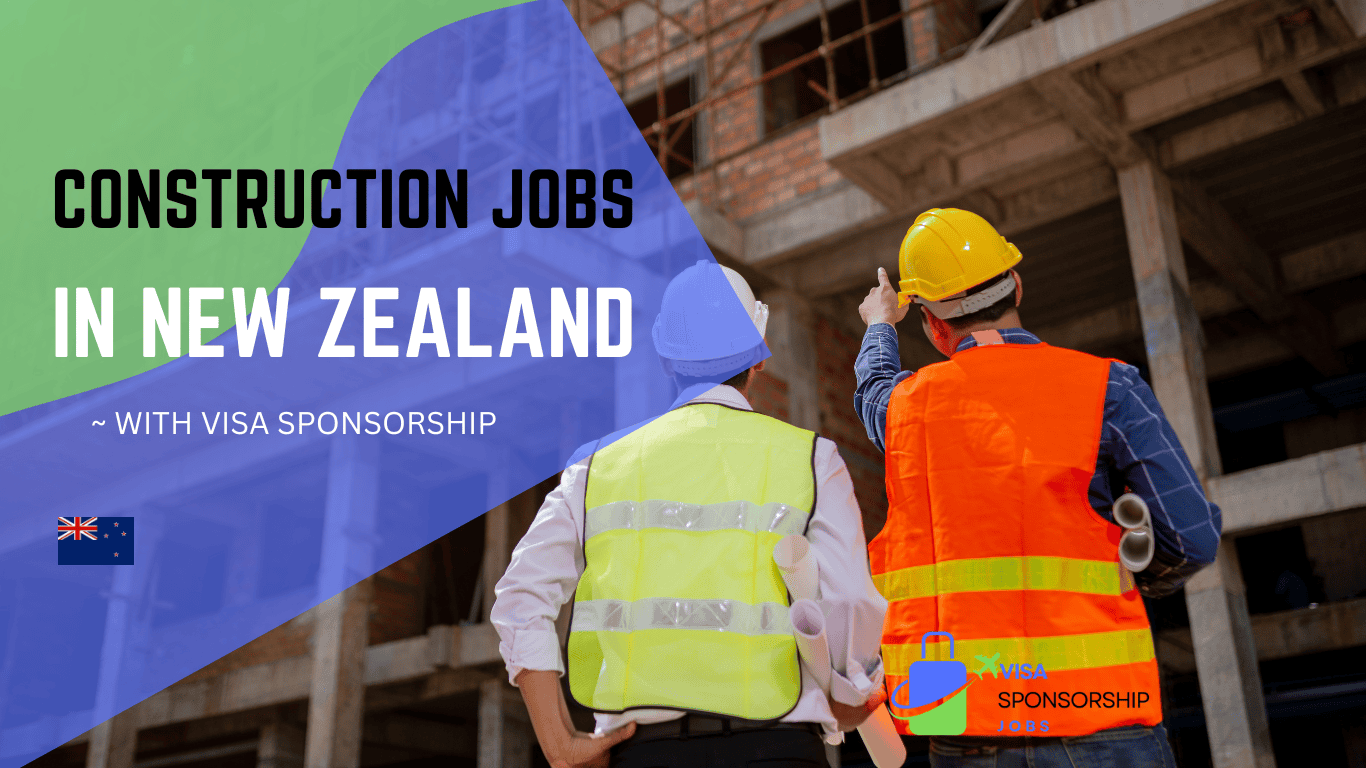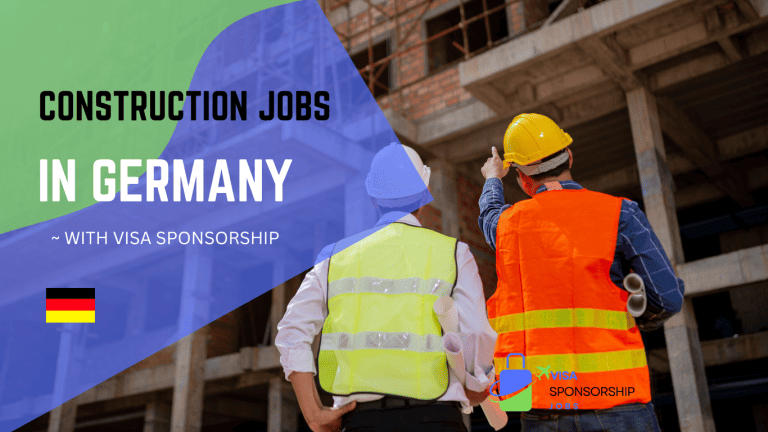Construction Jobs in New Zealand for Foreigners with Visa Sponsorship
New Zealand offers exciting opportunities for those seeking construction jobs with visa sponsorship.
The construction industry is booming, and many employers are eager to hire skilled workers from around the world. You can secure a position that supports your visa entry, allowing you to build a career while experiencing the beauty of New Zealand.
This blog post will guide you through the available options and how to land your ideal job in this vibrant market.
Eligibility Criteria for Construction Jobs in New Zealand with Visa Sponsorship
To work in construction in New Zealand, you must meet certain criteria for visa sponsorship. Here are the key requirements:
- Qualifications: You need a formal qualification in construction. This could be a certificate, diploma, or degree relevant to your field.
- Experience: Employers often look for candidates with relevant work experience in construction. Experience in specialized trades can be an advantage.
- Work Permit: You must have a valid work permit. This is typically arranged by your employer once you secure a job offer.
- Language Proficiency: Good communication skills in English are important. Some employers may require proof of English proficiency through tests like IELTS.
- Health and Character Requirements: You may need to pass health checks and provide police clearance to ensure you meet the health and character standards set by the New Zealand government.
- Job Offer: To be eligible for visa sponsorship, you usually need a confirmed job offer from a New Zealand employer. This employer must also be willing to support your visa application.
Each employer may have specific requirements, so it’s essential to research and prepare accordingly. Checking job listings can provide insights into what skills and qualifications are most sought after.
How to Find and Apply for Construction Jobs in New Zealand with Visa Sponsorship as a Foreigner
Finding construction jobs in New Zealand that offer visa sponsorship can be straightforward if you follow these steps.
- Use Job Websites:
- Visit websites like Indeed, SEEK, and Jora.
- Search specifically for “Construction Visa Sponsorship” jobs.
- Networking:
- Join online groups focused on construction work in New Zealand.
- Connect with professionals through LinkedIn.
- Prepare Your Resume:
- Make sure your resume highlights your skills and experience.
- Tailor your resume for each job application.
- Check Work Permit Requirements:
- Familiarize yourself with the visa process.
- Ensure you meet any qualifications needed for the job.
- Apply Directly to Companies:
- Research construction companies in New Zealand.
- Check their careers pages for openings.
- Follow Up:
- After applying, consider following up with an email or message.
- This shows your interest and can make you stand out.
Important Note: Some companies may only sponsor visas for specific positions. Make sure the roles you apply for are eligible for sponsorship.
By using these strategies, you can improve your chances of finding and securing a construction job in New Zealand as a foreign worker.
The Average Salary for Construction Jobs in New Zealand with Visa Sponsorship
When considering construction jobs in New Zealand with visa sponsorship, salary can vary based on experience, location, and specific roles.
Here’s a breakdown of average salaries you might expect:
- Entry-Level Positions:
- Typically range from $30,000 to $50,000 NZD per year.
- Mid-Level Positions:
- With a few years of experience, salaries can rise to $50,000 to $70,000 NZD annually.
- Senior-Level Positions:
- Highly experienced professionals can earn $70,000 to $100,000 NZD or more.
Other factors influencing salary include:
- Location:
- Salaries may be higher in major cities like Auckland or Wellington due to the cost of living.
- Type of Project:
- Specialized fields such as engineering or project management often offer higher pay.
- Employer:
- Large companies may provide more competitive salaries and benefits compared to smaller firms.
It’s essential to research specific job listings for the most accurate salary expectations. Websites like Indeed and Jora can help you find current vacancies and salary ranges tailored to your skills and experience.
Benefits of Construction Jobs In New Zealand With Visa Sponsorship
Working in construction in New Zealand offers several advantages, especially with visa sponsorship.
Here are some key benefits:
- Job Security: The demand for construction workers continues to grow in New Zealand. This means you are more likely to find stable employment.
- Attractive Salary Packages: Many construction jobs offer competitive salaries, allowing you to earn a good income. Some employers even provide additional benefits, such as bonuses or overtime pay.
- Skill Development: Working in New Zealand’s construction sector gives you the chance to improve your skills. You can learn new techniques and methods, enhancing your career prospects.
- Work-Life Balance: Many companies in New Zealand value work-life balance. You may have flexible work hours or options to work from home, depending on the role.
- Cultural Experience: Living in New Zealand exposes you to a rich culture. You can meet people from different backgrounds and enjoy various outdoor activities.
- Pathway to Permanent Residency: Being employed in a skilled job like construction can help you qualify for residency. This allows you to stay in New Zealand longer if you choose.
These benefits make construction jobs in New Zealand with visa sponsorship a favorable option for many workers.
Top Companies Offering Construction Jobs In New Zealand With Visa Sponsorship
Many companies in New Zealand are willing to sponsor visas for foreign workers in the construction field.
Here are some top options:
- Fletcher Building
- This company is one of New Zealand’s largest construction firms.
- They often hire skilled tradespeople and may provide visa sponsorship.
- Experience in construction or related fields is usually required.
- Downer EDI
- A major player in the infrastructure sector, Downer EDI offers various roles.
- They actively seek international talent and support visa applications.
- You might need relevant qualifications and work experience.
- Hawkins
- Hawkins specializes in large-scale projects and values diversity in its workforce.
- They consider sponsorship for skilled workers from overseas.
- A background in construction management can be beneficial.
- Concrete Solutions
- Known for their focus on innovative construction materials, they need skilled labor.
- They are open to sponsoring those with specialized skills.
- Relevant certifications will improve your chances.
- Beca
- Beca is an engineering consultancy that sometimes offers roles in construction.
- They sponsor skilled workers and provide training opportunities.
- Engineering or technical qualifications may be essential.
When considering employment, always check the specific visa requirements and job eligibility criteria.
Frequently Asked Questions
Which construction companies in New Zealand offer visa sponsorship for construction job applicants?
Several companies in New Zealand actively seek skilled workers and offer visa sponsorship. Prominent employers include major construction firms like Fletcher Building, Hawkins Construction, and Downer EDI. These companies often look for various roles, from carpenters to engineers.
Do all construction jobs in New Zealand offer visa sponsorship?
Not all construction jobs in New Zealand provide visa sponsorship. Many employers require specific skills or experience before they are willing to sponsor a candidate. It is essential to research job listings carefully to identify which positions include sponsorship opportunities.
What are the requirements to obtain a visa sponsorship for construction jobs in New Zealand?
To gain visa sponsorship, you typically need to meet certain criteria. This includes having a job offer from an accredited employer, meeting skill level requirements, and possessing relevant qualifications or experience in your field. Additional requirements may vary based on the specific visa type.
Are there entry-level construction jobs in New Zealand that provide visa sponsorship?
Yes, there are entry-level construction jobs that may offer visa sponsorship. Some companies are willing to hire less experienced workers if they show potential and a strong work ethic. However, the opportunities may be limited, so researching and applying early is advisable.
What is the average salary for construction jobs in New Zealand?
The average salary for construction jobs in New Zealand varies significantly based on experience and role. Generally, entry-level positions may start around NZD 50,000 per year, while more experienced roles can reach NZD 100,000 or more annually. Always check job postings for specific salary details.
Is prior experience required for securing a construction job with visa sponsorship in New Zealand?
Prior experience is often beneficial but not always required. Some employers may consider candidates without experience, especially for entry-level roles. However, possessing relevant skills or training can enhance your chances of being offered a job and sponsorship.
How can one apply for construction jobs in New Zealand with visa sponsorship?
To apply for construction jobs, start by searching job boards and company websites for openings that include visa sponsorship. Prepare your CV and cover letter tailored to each position. Once you find a suitable job, follow the application instructions provided in the listing.
How long does the visa sponsorship process take for construction jobs in New Zealand?
The visa sponsorship process can take varying amounts of time. Generally, it may take several weeks to a few months to receive a visa decision after submitting your application. Factors affecting processing time include the type of visa, employer readiness, and the volume of applications being processed.
What qualifications do I need for a construction job in New Zealand?
Qualifications needed will depend on your specific role in construction. Many positions require a relevant trade qualification or degree. Other roles might only need practical experience. It’s important to check specific job listings for detailed qualification requirements.







